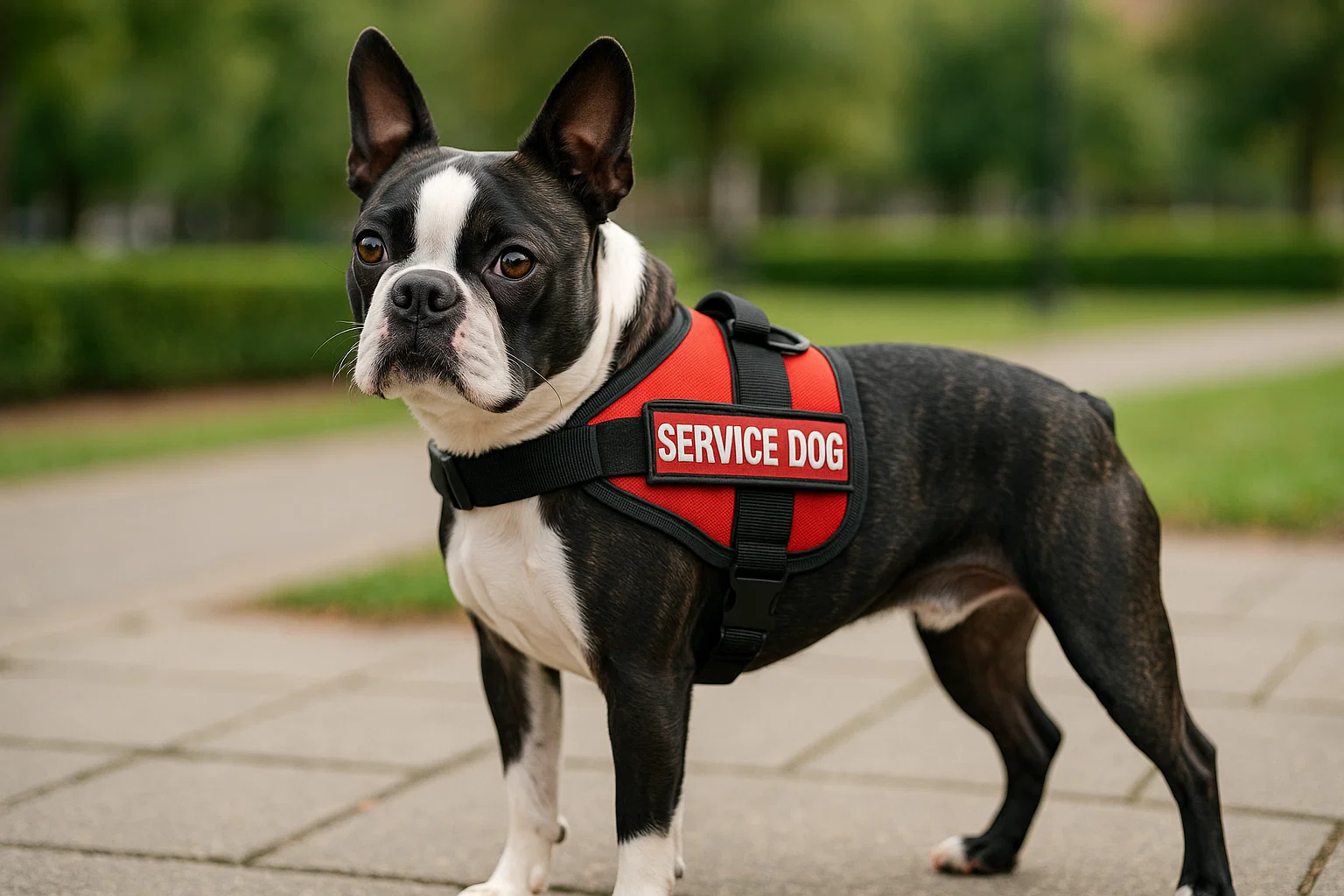Boston Terrier as a Service Dog
Get Your Documents

Boston Terrier Overview
The Boston Terrier, known as the “American Gentleman” due to its tuxedo-like coat and well-mannered demeanor, is a beloved breed recognized for its sociable nature and adaptability. While typically noted as a companion dog, this breed also possesses characteristics suitable for specific service dog roles. However, they aren’t universally acknowledged in all service capacities due to their size and health predispositions.
Physical Characteristics
Boston Terriers are compact and well-balanced dogs, generally weighing between 12 to 25 pounds and standing approximately 15 to 17 inches tall. Despite their small stature, they boast a sturdy build with a muscular frame. Their distinctive “tuxedo” coat coloration, combined with a square head and a short snout, makes them instantly recognizable.
- Size and Strength:
The Boston Terrier’s medium size makes them agile and easy to manage, which is advantageous for handlers who prefer smaller dogs. However, their limited size also restricts them from roles requiring significant physical strength, such as mobility assistance.
- Energy Levels:
These dogs have moderate energy levels, requiring regular exercise to maintain their health and happiness. They thrive in environments where they can receive both mental and physical stimulation. Their energy balance makes them suitable for individuals who need a dog to complement an active lifestyle without the requirements of a high-energy breed like a Border Collie.
Temperament and Attitude
The Boston Terrier is renowned for its friendly and gentle demeanor. These dogs are typically eager to please and exhibit a natural affinity towards people and other animals, making them excellent companions.
- Social Nature:
They are inherently social dogs and form strong attachments to their owners. Their outgoing disposition is favorable in many public and private service settings, as they generally respond well to strangers and new environments.
- Adaptability in Stressful Environments:
Boston Terriers tend to maintain composure in crowded or hectic environments, making them suitable for individuals needing a calm and resilient companion in busy spaces. Their stable temperament ensures they remain focused on their tasks even when faced with distractions.
- Limitations:
Despite their friendly disposition, Boston Terriers may occasionally exhibit stubbornness, requiring a patient and consistent training approach. They respond best to positive reinforcement techniques.
Types of Service Work
Boston Terriers, due to their size and personality, are more effective in specialized service roles rather than general all-purpose service dog duties.
- Emotional Support and Psychiatric Service Dogs:
Their innate ability to form strong bonds makes Boston Terriers exceptional emotional support animals (ESAs). In therapeutic settings, they provide comfort and companionship to individuals with mental health challenges, helping alleviate anxiety and depression.
- Therapy Dogs:
Often seen in therapy dog roles, Boston Terriers visit hospitals, schools, and nursing homes to offer comfort. Their manageable size and friendly nature make them excellent for interacting with children and individuals in vulnerable conditions.
- Assistance for the Hearing Impaired:
While not typical, some Boston Terriers can be trained as hearing alert dogs, notifying their handlers of important sounds such as alarms or doorbells.
Health Considerations
Boston Terriers are predisposed to several breed-specific health conditions that may affect their capabilities as service dogs.
- Brachycephalic Syndrome:
Their short muzzles can lead to breathing difficulties, particularly in hot or strenuous situations. This can limit their ability to engage in prolonged physical activities or handle extreme temperatures, impacting service in some environments.
- Eye Problems:
Due to their prominent eyes, Boston Terriers can be prone to cataracts or corneal ulcers, which may require medical attention and potentially interfere with their service dog efficacy.
- Joint and Mobility Issues:
While generally robust, Boston Terriers can experience patellar luxation or hip dysplasia, particularly if they are overweight. Maintaining a healthy weight is crucial for prolonging their service careers.
Training and Suitability
Training a Boston Terrier as a service dog involves leveraging their desire to please and social inclinations while accommodating their independent streak.
- Intelligence and Trainability:
Boston Terriers are intelligent and responsive, allowing for effective training using reward-based methods. They thrive in structured environments where clear expectations are set.
- Independence:
While affectionate, they have a degree of independence not typical of all companion breeds. This trait can be harnessed positively, allowing them to perform tasks even when the owner is temporarily not in their immediate presence.
- Consistency and Patience:
Training requires consistency and patience, particularly given their occasional stubbornness. With proper guidance, Boston Terriers can perform an array of helpful tasks within their capabilities.
Summary of Boston Terrier
In conclusion, while Boston Terriers may not be ideal for all-encompassing service roles due to their size and health predispositions, they excel in areas where companionship, emotional support, and light assistance can significantly impact their handler’s quality of life. Here is a concise summary of their capabilities and suitability for service work:
- Pros:
- Adaptable Nature: Thrive in various environments and social settings.
- Strong Bonding: Form deep connections, essential for emotional support and therapy roles.
- Manageable Size: Easy to handle, suitable for visits to public places.
- Cons:
- Health Concerns: Susceptible to brachycephalic syndrome and eye issues.
- Limited Physical Strength: Not suited for tasks requiring physical support.
- Training Challenges: Occasional stubbornness requires consistent training efforts.
Despite their limitations, Boston Terriers’ social disposition, adaptability, and affectionate nature make them well-suited for specific service roles where emotional connectivity and human interaction are paramount.**
Get Your Documents
Example State Cards













